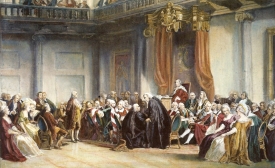diplomacy
The two countries that share peacetime borders with Israel, Jordan and Egypt, are dealing with a historic challenge presented by Islamic State, also known as ISIS, and its local extensions.
It was -3 degrees in Munich over the weekend and, inside the 51st Security Conference, there was an unmistakable cold war chill. For three days the Bayerischer Hof hotel was a security and diplomatic lockdown as western leaders clashed with Russian counterparts over the way into – and out of – the Ukraine crisis. Delegates arrived in glum agreement over the risks posed by the conflict, and departed after heated disagreements over whether military might or diplomatic skill could save the day.
A well-balanced foreign policy is needed for Thailand in light of competition between major powers, mainly the United States and China, to increase their influence over Southeast Asia, said prominent scholars in international relations.
The president’s 2015 National Security Strategy, released Friday, promised Americans the administration will confront a myriad of security and social threats with a strong focus on diplomacy and an aversion to meddling too much in developing events.

Addressing ambassador and experts at the Digital Diplomacy Day, Foreign Affairs minister George Vella said that diplomacy is a mixture of innovation and tradition, with its basic aspects dating back to practically the dawn of civilisation, but its needs changing as technology has progressed and continues to progress so fast.
A new election campaign brings about new stereotypes. It is now very common to hear that Israel does everything to maintain a policy of status quo with its neighbors, including the Palestinians. Looking at Israeli public opinion in the last twenty years, however, tells us that the opposite is true. If one takes election results as reliable indicators, it is possible to identify three characteristic phases in the mood of the Israeli public.
The United Nations is holding its first ever Social Media Day at its New York Headquarters today, in an event featuring social media professionals, digital diplomacy practitioners and academics who are sharing their experiences, discussing trends and proving insights into their work.







